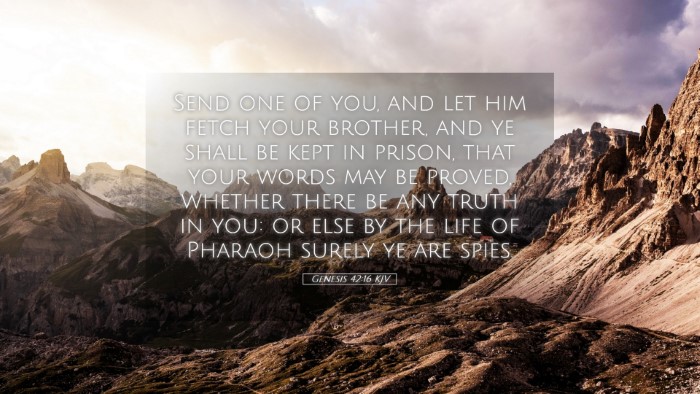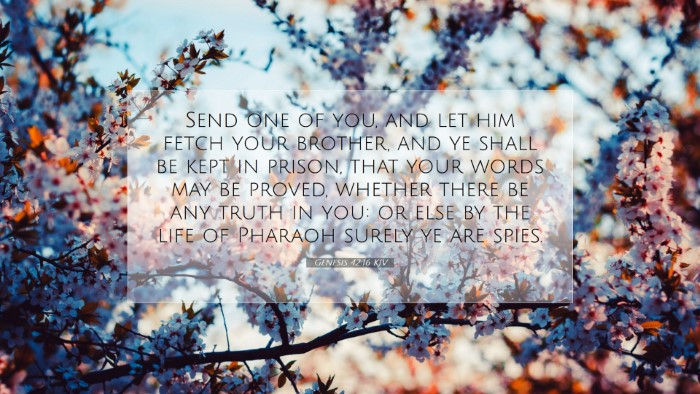Commentary on Genesis 42:16
Genesis 42:16 states: "Send one of you, and let him fetch your brother, and ye shall be kept in prison, that your words may be proved, whether there be any truth in you: or else by the life of Pharaoh surely ye are spies." This verse forms a critical juncture in the narrative of Joseph and his brothers, revealing themes of trust, deception, and divine providence. Below, we summarize insights from various public domain commentaries that provide depth and understanding for pastors, students, theologians, and scholars alike.
Contextual Background
The events leading up to chapter 42 are crucial for understanding this moment. Joseph, now a powerful figure in Egypt, encounters his brothers who come to buy grain during the famine. They are unaware of his identity, setting the stage for a complex interaction filled with tension and the unfolding of God’s plan.
Analysis of the Verse
Employment of Deception
Joseph's demand for one brother to be sent back to fetch their youngest brother, Benjamin, serves several purposes. According to Matthew Henry, Joseph aims to test his brothers' integrity and unify them, as their past treachery towards him raises legitimate concerns about their honesty.
Proof of Integrity
Joseph's instruction to keep the rest of the brothers in prison to verify their words serves as a shrewd strategy. Albert Barnes emphasizes that this is not merely an act of malice but a measure to ascertain the truth regarding their family situation and Benjamin’s well-being. Joseph desires to know if they have changed and if they mourn the loss of their favored brother, which they did not show when they sold him into slavery.
Joseph's Authority and Pharaoh's Life
The phrase “or else by the life of Pharaoh” signifies Joseph’s high-standing in Egyptian society. Adam Clarke notes that this oath underscores the seriousness of the accusation against the brothers, asserting that he holds the power of life and death in this situation. It invokes both reverence for Pharaoh and an understanding of Joseph's place as a ruler, compelling his brothers to respond truthfully.
Theological Interpretations
God's Providence
The situation exemplifies God’s providence throughout human actions. Joseph’s testing serves a dual purpose: allowing him to assess his brothers while simultaneously leading them towards repentance and restoration. Matthew Henry articulates that God can use our past sins for eventual good, promoting transformation through trials.
The Role of Testing
This testing is a recurring theme in Scripture, illustrating a method through which God reveals human nature. Albert Barnes indicates that trials often precede restoration, a motif evident in the lives of various biblical figures. The vulnerability of the brothers, exposed through suffering and famine, opens a pathway to humility and reconciliation.
Practical Applications
-
Personal Reflection:
This passage invites readers to evaluate their integrity and intentions, encouraging self-examination about how personal pasts influence current actions.
-
Leadership Insights:
Joseph’s discernment reflects on the importance of wise leadership—testing character before making decisions that could affect others.
-
Restoration and Forgiveness:
The narrative pushes individuals towards an understanding of the necessity of restoration following betrayal, urging the pursuit of reconciliation even amid difficult circumstances.
Conclusion
Genesis 42:16 encapsulates a profound moment of testing within a narrative rich with themes of betrayal, integrity, and the workings of divine providence. Through the insights of Matthew Henry, Albert Barnes, and Adam Clarke, we reflect on the implications of our actions, the importance of honesty, and ultimately the hope of restoration in the greater tapestry of God's redemptive plan. This verse serves not merely as a historical account but as a living word for today's believers, prompting continual reflection on our spiritual journeys.


